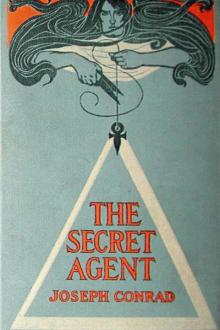author - "Joseph Conrad"

Description
The place is London, and the time is the late 1800s. Mr. Verloc appears to be an unassuming owner of a bric-a-brac store, but he’s actually a spy for an unnamed country. When he’s summoned by his superiors and ordered to plant a bomb to foment unrest in English politics and society, he finds himself stuck in a more-than-uncomfortable situation.
Conrad’s novel is set against the background of the Greenwich Observatory bombing, in which an anarchist unsuccessfully tried to detonate a bomb near the building. Terrorist activity was on the rise, and Conrad uses the fear and uncertainty of the time to explore the meanings of duty and of evil, along with the influence politics and political movements have on terrorist violence.
The Secret Agent is widely considered one of Conrad’s finest novels, with modern critics praising its prescient forecast of 20th century politics and society.

Description
Originally published serially as a three-part story, Heart of Darkness is a short but thematically complex novel exploring colonialism, humanity, and what constitutes a savage society. Set in the Congo in Central Africa, the tale is told in the frame of the recollections of one Charles Marlow, a captain of an ivory steamer. Marlow’s search for the mysterious and powerful “first-class agent” Kurtz gives way to a nuanced and powerful commentary on the horrors of colonialism, called by some the most analyzed work at university-level instruction.

g himself into liberty and a pension at last, or hadto go out of his gas-lighted grave straight into that other dark onewhere nobody would want to intrude. My humanity was pleased to discoverhe had so much kick left in him, but I was not comforted in the least. Itoccurred to me that if Mr. Powell had the same sort of temper . . .However, I didn't give myself time to think and scuttled across the spaceat the foot of the stairs into the passage where I'd been told to try.And I tried the first door I came to, right away, without any hangingback, because coming loudly from the hall above an amazed and scandalizedvoice wanted to know what sort of game I was up to down there. "Don'tyou know there's no admittance that way?" it roared. But if there wasanything more I shut it out of my hearing by means of a door markedPrivate on the outside. It let me into a six-feet wide strip between along counter and the wall, taken off a spacious, vaulted room with agrated window and a glazed door givin

ied; in which the narrator of the tale finds himself unexpectedly involved both on its ruthless and its delicate side.
"Falk" shares with one other of my stories ("The Return" in the "Tales of Unrest" volume) the distinction of never having been serialized. I think the copy was shown to the editor of some magazine who rejected it indignantly on the sole ground that "the girl never says anything." This is perfectly true. From first to last Hermann's niece utters no word in the tale -- and it is not because she is dumb, but for the simple reason that whenever she happens to come under the observation of the narrator she has either no occasion or is too profoundly moved to speak. The editor, who obviously had read the story, might have perceived that for himself. Apparently he did not, and I refrained from pointing out the impossibility to him because, since he did not venture to say that "the girl" did not live, I felt no concern at his indignation.
All the other stories were serialized. The "Typh

elt sure--he alone would know how to deal with the spurious menace of wind and seas. He knew what to think of it. Seen dispassionately, it seemed contemptible. He could detect no trace of emotion in himself, and the final effect of a staggering event was that, unnoticed and apart from the noisy crowd of boys, he exulted with fresh certitude in his avidity for adventure, and in a sense of many-sided courage.
CHAPTER 2
After two years of training he went to sea, and entering the regions so well known to his imagination, found them strangely barren of adventure. He made many voyages. He knew the magic monotony of existence between sky and water: he had to bear the criticism of men, the exactions of the sea, and the prosaic severity of the daily task that gives bread--but whose only reward is in the perfect love of the work. This reward eluded him. Yet he could not go back, because there is nothing more enticing, disenchanting, and enslaving

c was susceptible to these fascinations. Mr Verloc was an intermittent patron. He came and went without any very apparent reason. He generally arrived in London (like the influenza) from the Continent, only he arrived unheralded by the Press; and his visitations set in with great severity. He breakfasted in bed, and remained wallowing there with an air of quiet enjoyment till noon every day - and sometimes even to a later hour. But when he went out he seemed to experience a great difficulty in finding his way back to his temporary home in the Belgravian square. He left it late, and returned to it early - as early as three or four in the morning; and on waking up at ten addressed Winnie, bringing in the breakfast tray, with jocular, exhausted civility, in the hoarse, failing tones of a man who had been talking vehemently for many hours together. His prominent, heavy-lidded eyes rolled sideways amorously and languidly, the bedclothes were pulled up to his chin, and his dark smooth moustache covered his thick li

pree on shore suffices to unfold for himthe secret of a whole continent, and generally he finds the secretnot worth knowing. The yarns of seamen have a direct simplicity,the whole meaning of which lies within the shell of a cracked nut.But Marlow was not typical (if his propensity to spin yarns beexcepted), and to him the meaning of an episode was not insidelike a kernel but outside, enveloping the tale which brought itout only as a glow brings out a haze, in the likeness of one ofthese misty halos that sometimes are made visible by the spectralillumination of moonshine.
His remark did not seem at all surprising. It was just like Marlow. It wasaccepted in silence. No one took the trouble to grunt even; and presentlyhe said, very slow--
"I was thinking of very old times, when the Romans first came here,nineteen hundred years ago--the other day. . . . Light cameout of this river since--you say Knights? Yes; but it is like arunning blaze on a plain, like a flash of lightning in the clou

Description
Originally published as a serial, Nostromo is set in a fictional South American country where the outbreak of civil war puts the mining town of Sulaco in turmoil. Giovanni Battista Fidanza, known as Nostromo, is given the task of smuggling out a large amount of silver to keep it from the revolutionaries.
Conrad was inspired to write the book when he read, in a sailor’s memoir, the tale of a man who singlehandedly stole a boatload of silver. He had first heard the same story a quarter of a century earlier as a young sailor.
Nostromo has met with critical acclaim: it is often regarded as Conrad’s greatest novel and Francis Scott Fitzgerald said he would rather have written Nostromo than any other novel.

Description
The place is London, and the time is the late 1800s. Mr. Verloc appears to be an unassuming owner of a bric-a-brac store, but he’s actually a spy for an unnamed country. When he’s summoned by his superiors and ordered to plant a bomb to foment unrest in English politics and society, he finds himself stuck in a more-than-uncomfortable situation.
Conrad’s novel is set against the background of the Greenwich Observatory bombing, in which an anarchist unsuccessfully tried to detonate a bomb near the building. Terrorist activity was on the rise, and Conrad uses the fear and uncertainty of the time to explore the meanings of duty and of evil, along with the influence politics and political movements have on terrorist violence.
The Secret Agent is widely considered one of Conrad’s finest novels, with modern critics praising its prescient forecast of 20th century politics and society.

Description
Originally published serially as a three-part story, Heart of Darkness is a short but thematically complex novel exploring colonialism, humanity, and what constitutes a savage society. Set in the Congo in Central Africa, the tale is told in the frame of the recollections of one Charles Marlow, a captain of an ivory steamer. Marlow’s search for the mysterious and powerful “first-class agent” Kurtz gives way to a nuanced and powerful commentary on the horrors of colonialism, called by some the most analyzed work at university-level instruction.

g himself into liberty and a pension at last, or hadto go out of his gas-lighted grave straight into that other dark onewhere nobody would want to intrude. My humanity was pleased to discoverhe had so much kick left in him, but I was not comforted in the least. Itoccurred to me that if Mr. Powell had the same sort of temper . . .However, I didn't give myself time to think and scuttled across the spaceat the foot of the stairs into the passage where I'd been told to try.And I tried the first door I came to, right away, without any hangingback, because coming loudly from the hall above an amazed and scandalizedvoice wanted to know what sort of game I was up to down there. "Don'tyou know there's no admittance that way?" it roared. But if there wasanything more I shut it out of my hearing by means of a door markedPrivate on the outside. It let me into a six-feet wide strip between along counter and the wall, taken off a spacious, vaulted room with agrated window and a glazed door givin

ied; in which the narrator of the tale finds himself unexpectedly involved both on its ruthless and its delicate side.
"Falk" shares with one other of my stories ("The Return" in the "Tales of Unrest" volume) the distinction of never having been serialized. I think the copy was shown to the editor of some magazine who rejected it indignantly on the sole ground that "the girl never says anything." This is perfectly true. From first to last Hermann's niece utters no word in the tale -- and it is not because she is dumb, but for the simple reason that whenever she happens to come under the observation of the narrator she has either no occasion or is too profoundly moved to speak. The editor, who obviously had read the story, might have perceived that for himself. Apparently he did not, and I refrained from pointing out the impossibility to him because, since he did not venture to say that "the girl" did not live, I felt no concern at his indignation.
All the other stories were serialized. The "Typh

elt sure--he alone would know how to deal with the spurious menace of wind and seas. He knew what to think of it. Seen dispassionately, it seemed contemptible. He could detect no trace of emotion in himself, and the final effect of a staggering event was that, unnoticed and apart from the noisy crowd of boys, he exulted with fresh certitude in his avidity for adventure, and in a sense of many-sided courage.
CHAPTER 2
After two years of training he went to sea, and entering the regions so well known to his imagination, found them strangely barren of adventure. He made many voyages. He knew the magic monotony of existence between sky and water: he had to bear the criticism of men, the exactions of the sea, and the prosaic severity of the daily task that gives bread--but whose only reward is in the perfect love of the work. This reward eluded him. Yet he could not go back, because there is nothing more enticing, disenchanting, and enslaving

c was susceptible to these fascinations. Mr Verloc was an intermittent patron. He came and went without any very apparent reason. He generally arrived in London (like the influenza) from the Continent, only he arrived unheralded by the Press; and his visitations set in with great severity. He breakfasted in bed, and remained wallowing there with an air of quiet enjoyment till noon every day - and sometimes even to a later hour. But when he went out he seemed to experience a great difficulty in finding his way back to his temporary home in the Belgravian square. He left it late, and returned to it early - as early as three or four in the morning; and on waking up at ten addressed Winnie, bringing in the breakfast tray, with jocular, exhausted civility, in the hoarse, failing tones of a man who had been talking vehemently for many hours together. His prominent, heavy-lidded eyes rolled sideways amorously and languidly, the bedclothes were pulled up to his chin, and his dark smooth moustache covered his thick li

pree on shore suffices to unfold for himthe secret of a whole continent, and generally he finds the secretnot worth knowing. The yarns of seamen have a direct simplicity,the whole meaning of which lies within the shell of a cracked nut.But Marlow was not typical (if his propensity to spin yarns beexcepted), and to him the meaning of an episode was not insidelike a kernel but outside, enveloping the tale which brought itout only as a glow brings out a haze, in the likeness of one ofthese misty halos that sometimes are made visible by the spectralillumination of moonshine.
His remark did not seem at all surprising. It was just like Marlow. It wasaccepted in silence. No one took the trouble to grunt even; and presentlyhe said, very slow--
"I was thinking of very old times, when the Romans first came here,nineteen hundred years ago--the other day. . . . Light cameout of this river since--you say Knights? Yes; but it is like arunning blaze on a plain, like a flash of lightning in the clou

Description
Originally published as a serial, Nostromo is set in a fictional South American country where the outbreak of civil war puts the mining town of Sulaco in turmoil. Giovanni Battista Fidanza, known as Nostromo, is given the task of smuggling out a large amount of silver to keep it from the revolutionaries.
Conrad was inspired to write the book when he read, in a sailor’s memoir, the tale of a man who singlehandedly stole a boatload of silver. He had first heard the same story a quarter of a century earlier as a young sailor.
Nostromo has met with critical acclaim: it is often regarded as Conrad’s greatest novel and Francis Scott Fitzgerald said he would rather have written Nostromo than any other novel.

